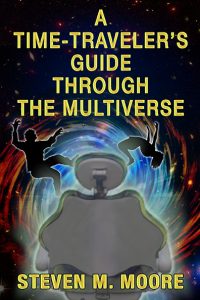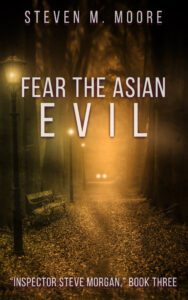I try to inform…
 Yes, my fiction is often complex. I sometimes receive that critique and then ignore it. You see, I don’t do simple; I refuse to write fluff. Even my comedy is complex; the rom-com The Time Traveler’s Guide through the Multiverse is hard sci-fi, and a lot in it informs and goes far beyond the fluff one often sees in that rom-com genre. (Did you know a secret op took place in Norway and destroyed the Nazi’s heavy-water production facility during WWII, helping to put an end to Hitler’s plans to develop the atomic bomb?) My stories’ plots, settings, and themes are designed to inform readers as much as (hopefully) entertain them.
Yes, my fiction is often complex. I sometimes receive that critique and then ignore it. You see, I don’t do simple; I refuse to write fluff. Even my comedy is complex; the rom-com The Time Traveler’s Guide through the Multiverse is hard sci-fi, and a lot in it informs and goes far beyond the fluff one often sees in that rom-com genre. (Did you know a secret op took place in Norway and destroyed the Nazi’s heavy-water production facility during WWII, helping to put an end to Hitler’s plans to develop the atomic bomb?) My stories’ plots, settings, and themes are designed to inform readers as much as (hopefully) entertain them.
I also inform readers and writers with my end notes. While many probably ignore them, nearly every book has them. I discuss what motivated me to write the story and offer references for further reading; I also acknowledge the real people who influenced the novel. I’m guessing people don’t read them because they’re not used to seeing such artistic candor? Most authors don’t bother. But both readers and writers can benefit from the information contained in them.
Of course, this blog also offers a wealth of information contained in these articles about reading, writing, and publishing. While my ideas on those subjects have evolved (and perhaps have become more acerbic and less mainstream?), I modestly believe that they inform readers of the blog about what goes on in this modern world of storytelling. (For writers and maybe readers, my course “Writing Fiction” collects many of those ideas. It’s a free PDF download available on the “Free Stuff & Contests” web page.)
All too often, authors only see their writing as a business and determine success by sales figures. I’ve never thought that way. Instead, I believe every author has an obligation to give something back to the community of writers, readers, and publishers (yes, even those associated with the Big Five and its sycophantic cadre of agents, although those authors never do), offering information others can use (or ignore at their own peril!), facts they might not know but can appreciate, and perspectives about our wonderfully diverse world and its peoples that can enrich their lives. I want to do my small part in achieving that.
Of course, I want to be true to myself and stick by my opinions, but I’ll often present the viewpoint of “the other side” in my prose. I will not be the next Ayn Rand or Karl Marx and write pure fiction that’s propaganda, but I might have characters who espouse libertarian or communist ideas. I realize that the spectrum of human beliefs and behavior is a wide one, and I want my prose to reflect that. Human beings are also political, and so I want my characters to be political as well. Fiction has to reflect reality; simple fluff never does!
***
 Comments are always welcome. (Please follow the rules on the “Join the Conversation” web page. If you don’t, your comment is considered to be spam.)
Comments are always welcome. (Please follow the rules on the “Join the Conversation” web page. If you don’t, your comment is considered to be spam.)
Fear the Asian Evil. This third book in the “Inspector Steve Morgan” series might seem ripped from the headlines after reports that President Biden strongly warned President-for-Life Xi about invading Taiwan. The book deals more with China’s long-standing policy of industrial espionage—they’d rather steal ideas than have to invent them—and fomenting unrest in western democracies. While it starts out as a typical police procedural—the sister-in-law of Morgan’s sergeant is shot—it acquires a spy-fi flavor that goes far beyond Christie’s typical British-style mysteries. Available wherever quality ebooks are sold (but not on Amazon).
Around the world and to the stars! In libris libertas!
